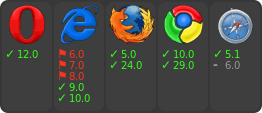ninjs-core
common utility methods
ninjs-core.argv -> minimist wrapper
https://github.com/substack/minimist
parse argument options
This module is the guts of optimist's argument parser without all the
fanciful decoration.


example
var argv = require('minimist')(process.argv.slice(2));
console.dir(argv);
$ node example/parse.js -a beep -b boop
{ _: [], a: 'beep', b: 'boop' }
$ node example/parse.js -x 3 -y 4 -n5 -abc --beep=boop foo bar baz
{ _: [ 'foo', 'bar', 'baz' ],
x: 3,
y: 4,
n: 5,
a: true,
b: true,
c: true,
beep: 'boop' }
methods
var parseArgs = require('minimist')
var argv = parseArgs(args, opts={})
Return an argument object argv populated with the array arguments from args.
argv._ contains all the arguments that didn't have an option associated with
them.
Numeric-looking arguments will be returned as numbers unless opts.string or
opts.boolean is set for that argument name.
Any arguments after '--' will not be parsed and will end up in argv._.
options can be:
-
opts.string - a string or array of strings argument names to always treat as
strings
-
opts.boolean - a boolean, string or array of strings to always treat as
booleans. if true will treat all double hyphenated arguments without equal signs
as boolean (e.g. affects --foo, not -f or --foo=bar)
-
opts.alias - an object mapping string names to strings or arrays of string
argument names to use as aliases
-
opts.default - an object mapping string argument names to default values
-
opts.stopEarly - when true, populate argv._ with everything after the
first non-option
-
opts['--'] - when true, populate argv._ with everything before the --
and argv['--'] with everything after the --. Here's an example:
> require('./')('one two three -- four five --six'.split(' '), { '--': true })
{ _: [ 'one', 'two', 'three' ],
'--': [ 'four', 'five', '--six' ] }
Note that with opts['--'] set, parsing for arguments still stops after the
--.
-
opts.unknown - a function which is invoked with a command line parameter not
defined in the opts configuration object. If the function returns false, the
unknown option is not added to argv.
ninjs-log
advanced logging using DEBUG env var with advanced typed formating,
fs output, middleware mappings, and color mappings
ninja setup (Windows exmaple)
set NODE_ENV=development && set DEBUG="api:twitter"
usage
First, setup your environment variables, NODE_ENV and DEBUG.
NODE_ENV environment var
The NODE_ENV environment var specifies your runtime nodejs env
and is used by several npm modules to alter configuration.
For example, the 'express' server module changes caching and all
sorts of optimations based on this value.
Typical values include : "development", "production"
Advanced values include : "test", "staging", "local"
If NODE_ENV === "production", NO log messages will leak to output.
DEBUG environment var
DEBUG environment var specifies what keyed log messages are allowed to leak to the output (ie. stdout or log.txt or log.json)
The express server module changes caching and all sorts of optimations based on this value.
Example on Windows:
set NODE_ENV=development
set DEBUG="api:twitter"
or
set NODE_ENV=development && set DEBUG="api:twitter"
process.env
NODE_ENV === "production" No logs leak
DEBUG=* All logs leak
DEBUG=something:blah:* Contains 'something:blah:' logs leak
DEBUG=something:blah Equals 'something:blah' logs leak
- set DEBUG=*
- set DEBUG=specific:file
Regular Expressions
/**
* File System
*/
/**
* Global Regex
*/
/**
* Alpha Characters
*/
// "white_space": /^\s+/,
// "alpha": /[A-Za-z]/,
// "dots": /\./g,
// "dashes": /^-|-$/g,
// "dash_dot_all": /^--([^=]+)=([\s\S]*)$/,
// "in_parenthesis": /\(([^()]+)\)/g,
// "in_braces": /\{([^}]+)\}/,
// "back_quote": /\"/g,
/**
* Numbers
*/
// "alpha_num": /[^a-z0-9]+/g,
// "num": /^0x[0-9a-f]+$/i,
// "digits": /^[-+]?(?:\d+(?:\.\d*)?|\.\d+)(e[-+]?\d+)?$/,
// "dig": /-?\d+(\.\d*)?(e-?\d+)?$/,
/**
* Boolean
*/
// "bool": /^(true|false)$/,
// "bool_lo": /true|false/,
/**
* Cmd
*/
/*
snapp/lodash - lodash wrapper + js base classes utils (string, object, array, funcitons, dates, etc.)
mod: lodash
info: Lodash modular utilities.
version: 4.13.1
web: https://lodash.com/
git: https://github.com/lodash/lodash
npm: https://www.npmjs.com/package/lodash
mod: numeral
info: A javascript library for formatting and manipulating numbers.
version: 1.5.3
web: http://numeraljs.com/
git: https://github.com/adamwdraper/Numeral-js
npm: https://www.npmjs.com/package/numeral
mod: jquery-deferred
info: jQuery deferred lib for nodeJS.
version: 0.3.0
git: https://github.com/zzdhidden/node-jquery-deferred
npm: https://www.npmjs.com/package/jquery-deferred
mod: moment
info: Parse, validate, manipulate, and display dates in javascript.
version: 2.13.0
web: http://momentjs.com/
git: https://github.com/moment/moment
npm: https://www.npmjs.com/package/moment
mod: backbone -> see snapp/backbone
*/
var path = require('path'),
util = require('util'),
_ = require('lodash'),
Backbone = require('backbone'),
moment = require('moment'),
numeral = require('numeral'),
jsonminify = require('jsonminify'),
beautifyHtml = require('pretty');
// STATIC
var EOL = require('os').EOL,
INFO_DEFAULTS = {
_name: "",
_version: "",
_r: "",
_dirname: "",
_filename: "",
_description: "",
_deps: {},
_devDeps: {},
_package: {},
_has: undefined,
_info: undefined,
_mixins: undefined,
_toFile: undefined,
_toFileData: undefined
},
INFO_KEYS = _.keys(INFO_DEFAULTS),
ERROR_MSG = '---->Default Error Occurred <----';
// REGX CACHE
var REGX_UTF_BOM = /^\uFEFF/,
REGX_COMMAS = /(\d+)(\d{3})/,
REGX_APLHA_NUM = /[^a-z0-9]+/g,
REGX_DASHES = /^-|-$/g,
REGX_BRACES = /{([^{}]*)}/g,
REGX_PARENTHESIS = /[{()}]/g,
REGX_SPECIAL = /[^a-zA-Z0-9-_.]/g,
REGX_SCRIPT = /<script([^'"]|"[^"]*"|'[^']*')*?<\/script>/gi,
REGX_SLASHES = /^\/+|\/+$/g,
REGX_TRAILING_SLASH = /\/+$/,
REGX_PHONE_TRIM = /\D/g,
REGX_US_PHONE = /^(\d{3})(\d{3})(\d{4})$/,
REGX_US_DOLLARS = /(\d)(?=(\d{3})+\.)/g,
REGX_SPACES = /\s+/g,
REGX_RETURNS = /(\r\n|\n|\r)/g,
REGX_LINES = /\r\n|\n\r|\n|\r/g,
REGX_LINES_COMPACT = /[^\r\n]+/g,
REGX_NO_COMMA_SEMI_AT_END = /[,,]$/,
REGX_OPEN_CLOSE = /[\(\)]/g,
REGX_QUERY_OBJECT = /[?&]([^=#]+)=([^&#]*)/g,
//REGX_COMMENTS = /((\/\/.*$)|(\/\*[\s\S]*?\*\/))/mg;
REGX_COMMENTS = /(\/\/.*$)|(\/\*[\s\S]*?\*\/)|(\s*=[^,\)]*(('(?:\\'|[^'\r\n])*')|("(?:\\"|[^"\r\n])*"))|(\s*=[^,\)]*))/mg,
REGX_ARG_NAMES = /([^\s,]+)/g,
REGX_STUFF_IN_PARENTHESES = /\(([^()]+)\)/g,
REGX_BACK_QUOTE = /\"/g;
## snapp
version: 0.0.1
global utils lib required by all other snapp-* libs
snapp nodejs utils lib
### drive
typed file system api
#### drive models
abstract models for reading/writing collections/models to disk (with most file formats)
### pretty
mod: pretty
info: Some tweaks for beautifying HTML with js-beautify
version: 1.0.0
git: https://github.com/jonschlinkert/pretty
npm: https://www.npmjs.com/package/pretty
### stream
request(url)
.on('error', function (err) {
callback(err);
})
.on('response', function (res) {
console.log(res.statusCode) // 200
console.log(res.headers['content-type']) // 'image/png'
callback(null, res);
})
.pipe(disk.createWriteStream(dest));





